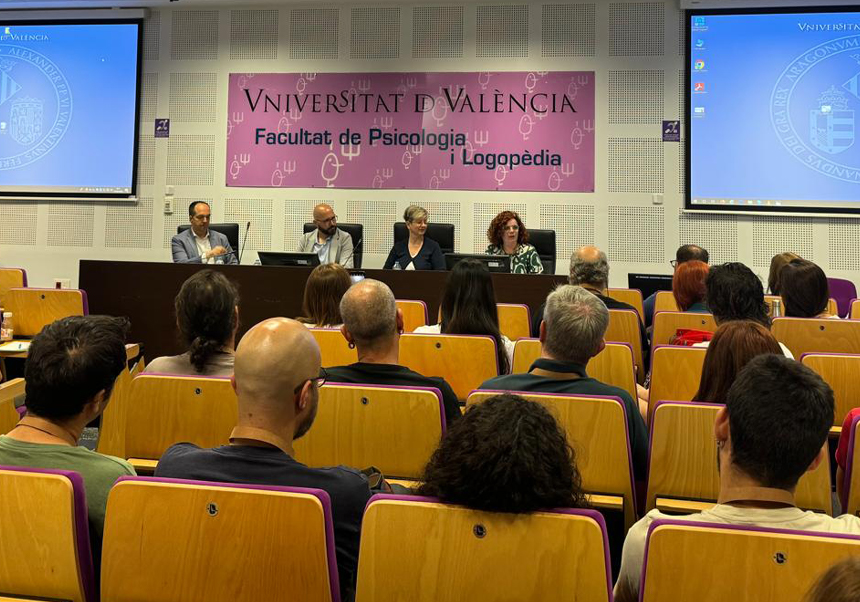
On Friday 13, the 2nd Conference on Socio-educational accompaniment for Adolescents and Young people of the Youth Chair was held in the Faculty of Psychology, and it was organised by the UV Youth Chair.
The Youth Chair of the Universitat de València celebrated the 2nd Conference on Socio-educational accompaniment for Adolescents and Young people on the 31 May. Professionals from diverse fields of study took part: youth services of the local or supralocal administration, of social projects, of health, of companies of the sector, of education…
The conference started with the speech of the Vice-principal for Equality, Diversity and Inclusive Policy Sylvia Martínez; the Head of the Institut Valencià de la Joventut (the Youth Institute of Valencia), Vicent Ripoll; the Mayor of Aldaia, Guillermo Luján, the Head of the Youth Chair, Paz Viguer.
Afterwards, in a crowded assembly hall, Pere Soler, professor of the Department of Pedagogy in the University of Girona and Head of the Interuniversity Master’s Degree of Youth, moved and charmed the attendants with a comprehensive overview of accompaniment and empowerment. At the same time, he highlighted the need of meeting some conditions so that both are achievable, conditions that governments should guarantee. We could summarise his speech with the image of ''give clues'' (to open doors) to adolescents and young people so that they can directly experience responsibility and empowerment.
After a coffee break, supplied by a social entity that works with young people and uses recyclable materials, attendants went consecutively through three workshops that identified three of the most important elements of socio-educational accompaniment.
In the ‘identity workshop’, Juanjo Zacarés and Alícia García, from the UV Department of Developmental Psychology, worked on the evolutionary stage tasks, the concept of identity, as well as how can we professionals contribute to its development in the adolescents we work with. They used cultivation, with seeds, flowering plants, gardeners, watering cans, among others, as a unifying thread.
In the ‘creating a bond’ workshop, Cris Tiana and David Abellán, from the non-institutional project Medio Abiertodel Prat de Llobregat, used roleplay and improvised staging of the participants to explain the basic elements of bond creation and the resources that educators should have to manage successfully the diversity of situations (among those, sunflower seeds).
In the ‘community’ workshop, Andrea Ariza and Mireia López, from the La Dula Cooperative, explored the resources we have in order to deal with problems and with which tools we do it. They did it together with the professional attendants using the fish bowl technique.
Attendants worked hard in the three workshops, which ended up going by quite fast. In each workshop, they were given an object (soil, seeds, and a test). All three together would allow them to plant a small sunflower. The meaning of each object was not revealed until they got to the conclusion part.
On the other hand, the purpose of the workshops was not that attendants would leave with final answers. Instead, it was that they could learn the utmost importance of the three elements they worked in, to ask themselves questions about how they develop their daily work and, perhaps, make them think about their priorities in their programmes. The Accompaniment Conference is not an educational, but rather a sensitising space, a space where professionals meet to think about the main questions that we need to ask ourselves. Somehow, it is accompaniment of accompaniment, as it helps ask questions that professionals will have to answer for themselves, the same way that accompaniment figures do with the people they accompany. We will go further on these topics in the Autumn Workshops.
Once again, in the Assembly Hall, attendants were given bags of sunflower seeds, with no explanation, courtesy of El Manisero.
Jonatan Ruiz and Salvador Avià, from the Chair team, briefly presented the work that is going on to create a guide for incorporating accompaniment to local youth programmes.
After that, the narrators of the workshops (Elisabet Català, from the City Council of Aldaia; Jonatan Ruiz; Marcos Garcia Vidal, from the COEESCV, that is the Official Association of Social Educators of Valencia) summarised each workshop. At the end, Maria Josep Picó (who dynamically conducted the round table during the conference) and Paz Viguer, commented the conclusions of the conference and explained, with the help of the attendants, the meaning of the sunflower and the seeds: process, growth, seeds that bloom, time and patience, attention and care. And of course, seeds as a resource to sit together with young people, talk, and create efficient socio-educational relationships.
It should be noted the work of the Organising Committee, that integrated collaborating entities for the first time: Elisabet Català (City Council of Aldaia); Yolanda Gómez (Mancomunidad de la Ribera Alta); Èlia Calvo (Mancomunidad Els Ports); Marcos Garcia-Vidal (COEESCV). From the Youth Chair took part Enrique Deltoro, Jonatan Ruiz, David Gil, Paz Viguer, Fernando Marhuenda, Alícia Garcia, and Salvador Avià as coordinator. We must also thank the IVAJ (the Youth Institute of Valencia), the Universitat de València, and the UV Languages Service for their support.


